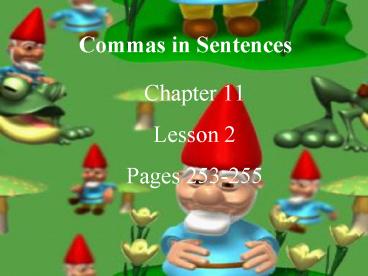Commas in Sentences - PowerPoint PPT Presentation
1 / 51
Title:
Commas in Sentences
Description:
Most people know Thomas Edison for his creation of the light bulb, but he also ... Thomas Edison, an American inventor, is responsible for many patents. ... – PowerPoint PPT presentation
Number of Views:306
Avg rating:3.0/5.0
Title: Commas in Sentences
1
Commas in Sentences
- Chapter 11Lesson 2Pages 253-255
2
Objective
- To apply rules for using commas in sentences.
3
Commas in Compound Sentences
4
- Use a comma before a conjunction that joins
independent clauses in a compound sentence.
5
- Most people know Thomas Edison for his creation
of the light bulb, but he also developed many
communication devices.
6
- Edisons inventions were completely new, or they
were refined versions of other works.
7
- Alexander Graham Bell devised the modern
telephone, and Edison improved it by adding a
stronger vocal transmitter.
8
Watch Out!
- Sometimes a sentence has a compound verb, but is
not a compound sentence.
9
Watch Out!
- Do not use a comma in this kind of sentence.
10
Watch Out!
- Edison also constructed a model and tested the
first phonograph.
11
Commas with Items in a Series
12
Use a comma after every item in a series except
the last one.
13
Curiosity, ingenuity, and determination were
qualities that helped shape Edisons career.
14
Edisons phonograph mainly consisted of a metal
disk, a steel needle, and a rotating cylinder.
15
In time, Edisons recording mechanism generated
other inventions dictation machines, musical
records, and talking dolls.
16
Use commas between two or more adjectives of
equal rank that modify the same noun.
17
In his youth, Edison was a likable, clever
prankster.
18
To decide whether to use a comma between two
adjectives modifying the same noun
19
Place the word and between the adjectives.
20
In his youth, Edison was a likeable and clever
prankster.
21
2. If the sentence still makes sense, replace
and with a comma.
22
2. In his youth, Edison was a likable, clever
prankster.
23
3. Another test is to reverse the order of the
adjectives.
24
3. In his youth, Edison was a clever and likable
prankster.
25
4. If the meaning of the sentence hasnt
changed, replace and with a comma.
26
4. In his youth, Edison was a clever, likable
prankster.
27
Commas with Introductory Words and Phrases
28
Use a comma after an introductory word or
phrase to separate it from the rest of the
sentence.
29
Slowly, Edison learned to use the telegraph.
30
Hampered by poor hearing, he invented the
repeating telegraph.
31
Commas with Interrupters
32
Use commas to set off words or phrases that
interrupt, or break, the flow of thought in a
sentence.
33
Edison, at last, could pick up whole
telegraph messages.
34
Commas with Nouns of Direct Address
35
Use commas to set off nouns of direct address.
36
Tell us, Kyla, how Edison helped the movie
industry.
37
Commas with Appositives
38
An appositive is a word or phrase that
identifies or renames a noun or pronoun that
comes right before it.
39
Use commas when the appositive adds extra
information.
40
Do not use commas when the appositive is
needed to make the meaning clear.
41
Thomas Edison, an American inventor, is
responsible for many patents.
42
The American inventor Thomas Edison had
patents for 1,093 inventions.
43
Commas to Avoid Confusion
44
Use a comma whenever the reader might
otherwise be confused.
45
Edison built a huge laboratory for inventing
his lifes work.
46
Edison built a huge laboratory for inventing,
his lifes work.
47
So What?
- Proper mechanics
- ISAT
48
- 1888,
- 1906,
- Fessenden,
- Canada,
- speaking,
49
- 1930,
- pilots,
- police,
- began,
- experts,
50
Closure
- Today you learned to apply rules for using commas
in sentences.
51
Homework
- Grammar, Usage, and Mechanics Workbook
- Page 193-194
- Due Tomorrow































